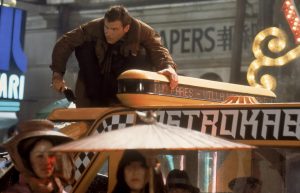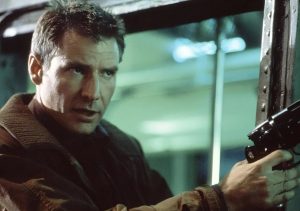Blade Runner (1982) is a science fiction classic directed by Ridley Scott. The film, based on Philip K. Dick’s novel Do Androids Dream of Electric Sheep?, explores deep themes such as identity, morality, and humanity. Set in a dystopian future, it remains a benchmark for the genre.
Plot Overview
The story takes place in Los Angeles, 2019, a city enveloped in rain and darkness. Rick Deckard (Harrison Ford), a retired “Blade Runner,” is called back to duty. His mission is to track down and eliminate rogue replicants—bioengineered beings created to look and act like humans. These replicants, led by Roy Batty (Rutger Hauer), have returned to Earth, desperately seeking to extend their short lifespans. Along the way, Deckard begins to question the morality of his work, particularly as he forms a connection with Rachael (Sean Young), a replicant unaware of her true nature.
Visuals and Atmosphere
Blade Runner stands out for its mesmerizing visuals. The production design blends futuristic cityscapes with a worn, noir-inspired aesthetic. Every frame feels alive, thanks to the atmospheric lighting and intricate details. The haunting score by Vangelis enhances the mood, creating a world both beautiful and unsettling.

Performances
Harrison Ford delivers a compelling performance as Deckard, capturing the character’s internal conflict. Rutger Hauer steals the show as Roy Batty, combining menace with vulnerability. His unforgettable “Tears in Rain” monologue is an emotional highlight. Sean Young and Edward James Olmos also provide strong support, adding complexity to the story.

Themes and Legacy
The film asks profound questions about the nature of humanity. Are replicants, with their desires and emotions, any less human than the people hunting them? It also explores themes of mortality and free will, leaving the audience with much to ponder. Blade Runner‘s influence on science fiction and popular culture cannot be overstated. It paved the way for countless films, TV shows, and games.

Flaws
Although the film is a masterpiece, its pacing can feel slow at times. Some characters remain underdeveloped, and the original theatrical release’s voiceover narration drew criticism. Thankfully, later cuts resolved some of these issues, offering a more satisfying experience.
Conclusion
Blade Runner (1982) is a visually stunning and thought-provoking film that redefined the science fiction genre. Its exploration of morality and identity remains as relevant today as it was upon release. Whether you’re a fan of sci-fi or simply love great cinema, this is a must-watch.
